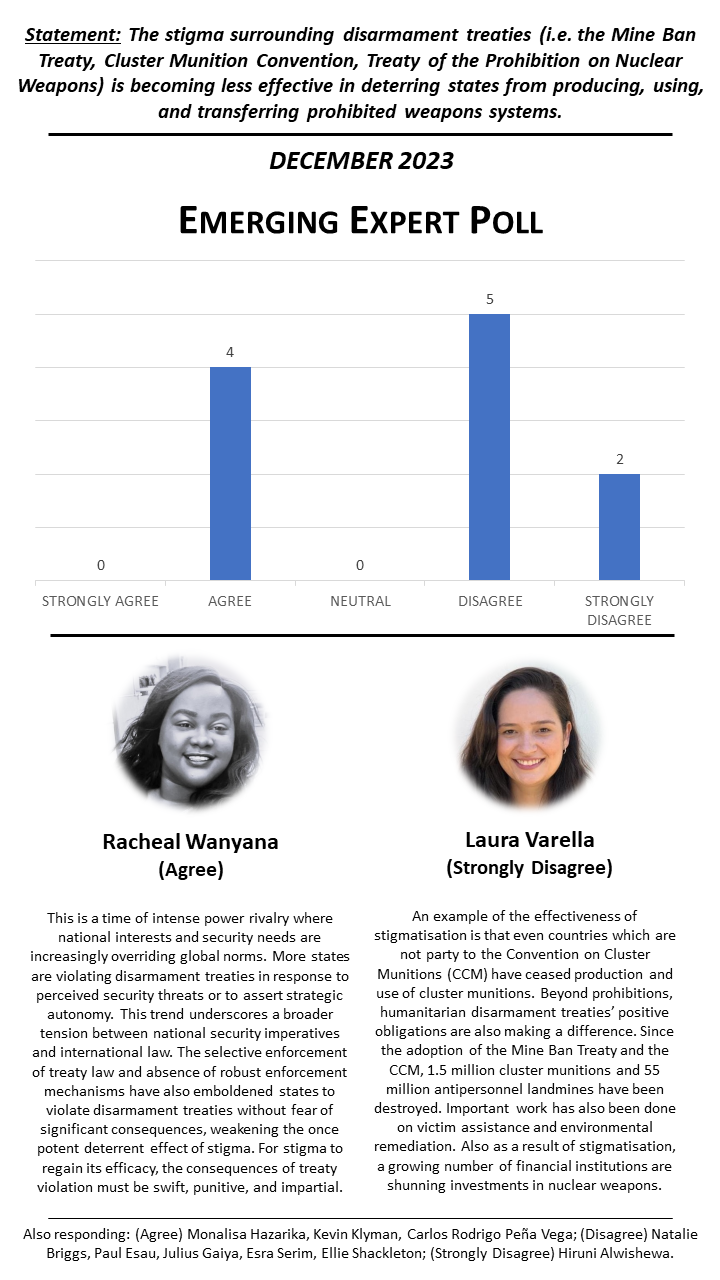Stigma still working?
The Forum asks Emerging Experts*
December 2023
December 2023
STATEMENT: The stigma surrounding disarmament treaties (i.e. the Mine Ban Treaty, Cluster Munition Convention, Treaty on the Prohibition of Nuclear Weapons) is becoming less effective in deterring states from producing, using, and transferring prohibited weapons systems.
See all responses below, and click on photos for more information about each expert:
Agree
|
Monalisa Hazarika
As the line between self-defense and war crimes has blurred, the credibility and enforcement of most disarmament treaties have been tainted by public skepticism, especially in light of recent events. Despite evidence of the use of illegal weapons systems, the paucity of actions to hold the perpetrators accountable has led to declining ethics among states that continue to operate with impunity. It will not be long before cities are turned into rubble and wastelands of misplaced faith if the current disarmament framework is not recalibrated to reflect the complex and changing nature of modern warfare. |
|
Kevin Klyman
Though the moral force of disarmament treaties is undiminished, ongoing proliferation has shown that the stigma they carry has weakened. Vertical proliferation of nuclear weapons is especially concerning: while much of the world favors a massive reduction in nuclear stockpiles, many nuclear-armed states are investing heavily in expanding or enhancing their arsenals. The recent use of cluster munitions in Ukraine, Myanmar, and Syria may weaken stigma against the use of such banned weapons. These developments are a worrying indication that future efforts to constrain autonomous weapons or other military applications of emerging tech on humanitarian grounds may be met with limited success. |
|
Carlos Rodrigo Peña Vega
The war in Ukraine has significantly influenced how international security is interpreted. Since February 2022, many countries have taken a more pragmatic approach, increasingly agreeing on the idea that being armed is more secure rather than relying on international law, the legitimacy of which has been jeopardized by Russia. Specifically on disarmament treaties, this perspective may influence countries to re-evaluate their stance, particularly those who position themselves as “counterweights” of the Western influence in the global scenario. The latest example of this is the Russian decision to de-ratify the Comprehensive Nuclear Test Ban Treaty in October 2023. |
|
Racheal Wanyana
This is a time of intense power rivalry where national interests and security needs are increasingly overriding global norms. More states are violating disarmament treaties in response to perceived security threats or to assert strategic autonomy. This trend underscores a broader tension between national security imperatives and international law. The selective enforcement of treaty law and absence of robust enforcement mechanisms have also emboldened states to violate disarmament treaties without fear of significant consequences, weakening the once potent deterrent effect of stigma. For stigma to regain its efficacy, the consequences of treaty violation must be swift, punitive, and impartial. |
Disagree
|
Natalie Briggs
While the past year has resulted in heightened tensions, the continuance of one war, and the outbreak of another, there has still been progress in disarmament treaties. One example: Bulgaria, Slovakia, South Africa, and Peru recently completed processes to destroy their stockpiled cluster munitions as mandated by the Convention on Cluster Munitions. Another example: the first - ever resolution in this year's 1st Committee calling for progress toward a binding international legal instrument regulating lethal autonomous weapons systems (LAWS). Finally, the second meeting of states parties to the TPNW in New York held participation from 92 countries who successfully adopted a political declaration and package of decisions |
|
Paul Esau
While public stigma is one of the most effective means of deterring states from producing, using, and transferring controversial weapons, prohibition treaties which formalize this stigma into a legal mechanism generally require an iterative approach. Eventual successes, such as the Chemical and Biological Weapons Conventions and the Mine Ban Treaty, are rare and emerge from periods of tremendous international consensus, profound skepticism about the military utility of the targeted weapon, and a relatively stable geopolitical environment. Measuring the efficacy (or stigma) of disarmament treaties by the unusual success of the post-Cold War period is deceptive and obscures longer historical trends. |
|
Julius Gaiya
I perceive the treaties are still effective and may result in positive outcomes: 1. I believe there is a growing acceptance and normalization of disarmament, which could contribute to the overall progress towards global peace and security. 2. I feel this also may create opportunities for dialogue and engagement, encouraging states to openly discuss disarmament issues and find common ground. |
|
Esra Serim
Many disarmament treaties are still capable of restricting or prohibiting the development, possession, use, and transfer of certain weapons. Through these treaties, the use of some weapons in armed conflict is still restricted by the general rules and principles of international humanitarian law and the measures that must be taken to minimise the impact of armed conflict on the civilian population and the environment. |
|
Ellie Shackleton
Disarmament treaties are not becoming less relevant when it comes to transferring weapons since state parties to the treaties generally follow them. Challenges have instead come from rogue actors and those who are not party to these treaties who are using and abusing these weapons in contravention of international norms and laws. |
Strongly Disagree
|
Hiruni Alwishewa
The stigma surrounding disarmament treaties has not declined, rather the increasingly contentious international political climate has resulted in states disregarding widely accepted prohibitions for these types of weapons, the use of which are also a clear violation of international humanitarian law. In current conflict situations, the decisions to produce, use or transfer such weapons can be a deliberate tactic to gain military advantage over an opposing party. This has been noticeably evident in the decision by the United States to transfer cluster munitions to Ukraine because of their psychological impact on the Russian armed forces. |
|
Laura Varella
An example of the effectiveness of stigmatisation is that even countries which are not party to the Convention on Cluster Munitions (CCM) have ceased production and use of cluster munitions. Beyond prohibitions, humanitarian disarmament treaties’ positive obligations are also making a difference. Since the adoption of the Mine Ban Treaty and the CCM,1.5 million cluster munitions and 55 million antipersonnel landmines have been destroyed. Important work has also been done on victim assistance and environmental remediation. Also as a result of stigmatisation, a growing number of financial institutions are shunning investments in nuclear weapons. |
* Inclusion in this list does not indicate agreement with or endorsement of the opinions of others, nor do the opinions necessarily reflect those of the institutions with which emerging experts are affiliated. To learn more about the Emerging Experts list and program, click here and aquí. The Forum itself does not take positions.
This program is typically funded by the Rosa-Luxemburg-Stiftung New York Office with support from the German Ministry for Economic Cooperation and Development (BMZ). The Forum's work is further supported by the Carnegie Corporation of New York and the Rockefeller Brothers Fund.
This program is typically funded by the Rosa-Luxemburg-Stiftung New York Office with support from the German Ministry for Economic Cooperation and Development (BMZ). The Forum's work is further supported by the Carnegie Corporation of New York and the Rockefeller Brothers Fund.












